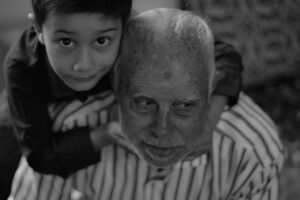Out of my 4 grandparents, my paternal grandfather, may he be alive and well for many more years to come, is 94, almost 95, is the only one still alive. He lives on his own in his home, with an aide coming in to check in on him. My maternal grandfather was young and died of cancer when I was only 12. My paternal grandmother lived on her own until her death, also when I was young, from Lewy Body disease. My maternal grandmother lived on her own until almost the very end, when she moved into an assisted living place where she spent the last years of her life.
As my parents are getting older, the thought comes to mind about what will be when they are older. Who will take care of them? Will they live on their own? In an assisted living facility? Nursing home? want to live with one of their children?
If you’re almost in the sandwich generation, you’ve probably also had similar thoughts. Here are some reasons to consider keeping them getting care in their own home.
More and more elderly people want to grow old in their homes. Behind this decision, there are many factors, such as being able to maintain independence and established social ties.
However, whether due to the deterioration of psychomotor skills that can occur with age or simply for the peace of mind of receiving immediate help for any problem that may arise, home care options are ideal alternatives that adapt to the needs of each person and, above all, encourage staying at home.
Let’s get the hang of the main benefits of aging at home and how this affects the well-being and quality of life of seniors.
Staying at Home
It is essential that older people choose where and how they want to age since not respecting their right to make decisions about their own lives is a form of abuse.
According to the AARP survey, more than 70% of older adults want to stay at home as long as possible. Staying at home during the golden age provides numerous advantages for physical, mental, and emotional health. For example, aging at home avoids the stress of facing unfamiliar situations and environments, allows for close contact with loved ones, and provides greater freedom and privacy.
Adaptation in Care and Better Quality of Life
Another characteristic of home care for the elderly is personalized attention. Home care should be tailored to the personal characteristics and health status of the elderly person. There are situations in which the elderly person requires care for a few hours a day (meal prepping, getting dressed, etc.) while others need permanent care (bathing, feeding, giving medication, etc.).
The caregiver helps the elderly person with household chores: preparing food according to their diet, making sure they take their medications, helping them with daily hygiene, stimulating them physically and cognitively, and accompanying them to go shopping, go for walks, and to medical visits. Additionally, caregivers may help in choosing a mobility device like a wheelchair or a full-size mobility scooter to ensure the elderly maintain their independence and can move around safely. These devices can significantly boost the quality of life by allowing the elderly to participate in activities they enjoy.
Routines are Maintained
Organizing certain aspects of the daily life of older people is essential to avoid disorientation, improve autonomy, and prevent certain common conditions. It is vital to maintain a routine for the elderly in the following aspects:
- Sleep: Maintaining consistent bedtimes and wake-up times is a great help in preventing sleep disorders in older people.
- Nutrition: A balanced diet allows seniors to obtain all the essential nutrients to enjoy a healthy lifestyle.
- Hygiene: Following a hygiene routine in old age is essential for taking care of their health, as it prevents diseases and infections, increases self-esteem, and improves mood, in addition to other benefits.
Home care services play a key role in helping seniors follow all these routines and promote healthy habits, improving their health status.
Modern technology can also be an excellent companion for elderly people to track their daily routines. For example, such services include reminders for medical appointments and taking medication, as well as follow-up notifications to keep everything on schedule. Some medical devices also come with a fall detection feature and an SOS button in case emergency help is needed.
Comfort and Better Mood
Depending on their physical and cognitive state, older people may become depressed and experience episodes of anxiety due to not being able to do the activities they used to do or because they feel lonely.
In addition to ensuring their safety, health, and well-being, caregivers keep them company and help them with everyday tasks. This helps the elderly person feel much better emotionally and increases their self-esteem.
Senior-friendly activities allow them to have fun, which should be done at all ages, not just during childhood. They also encourage social relationships with people of their age who still retain many of their abilities and skills.
In order for an elderly person to enjoy high self-esteem and mood, it is very important to help him or her maintain as much self-sufficiency and independence as possible, always within their current abilities and skills. The caregiver will be the senior’s greatest daily support.
Effective Bond Between Caregiver and the Elderly Person
With home care, the elderly person can enjoy the company they need to talk to and be listened to. In this way, the feeling of loneliness is prevented.
Professionals prevent the elderly from becoming socially isolated and manage to establish bonds of friendship with those they care for so that they do not feel abandoned. This is one of the main mental health problems that appear in older people nowadays.
Affordable Care
Sometimes, especially if the elderly person has a certain degree of dependency, relatives consider relocating the elderly person to a nursing home as their first option.
This is mainly due to the misconception that nursing homes are the most affordable alternative for the family and the financial sector. However, home care, in addition to bringing numerous benefits on the like of those discussed in this article above, is one of the most accessible alternatives for a large part of elderly and dependent people.
Conclusion
Home care is a booming model that continues to advance with increasingly innovative services adapted to the care demands of society at all times and with multiple benefits for the elderly. The role of the caregiver is fundamental in meeting the vital needs of an elderly person, such as feeding, hygiene, or administering medication.
But it is also important to help seniors feel active so that they can continue to enjoy a full and happy life, something that we can achieve through leisure and free time activities, maintaining their hobbies, and promoting social relationships; but, above all, by listening to them and making them participate in decisions.




